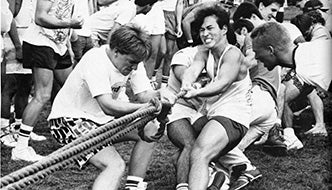In 1865, Albert M. Harper was elected the first Grand Marshal by the all-male Rensselaer Polytechnic Institute student body. He was chosen in recognition of his military service, wisdom, and “manly qualities,” according to The Transit, the Rensselaer yearbook, which wrote about Harper in 1885, 20 years and 20 Grand Marshals later.

Albert M. Harper
It’s been 149 years since Harper’s election began the Grand Marshal tradition at Rensselaer, and it is still going strong today. The student body will elect a new Grand Marshal and president of the Rensselaer Union next Thursday, April 10.
According to that 1885 editorial in The Transit, Harper, of Pittsburgh, Pa., enrolled at Rensselaer in 1860 when he was 19. Two years later, as the Civil War raged on, he left school to enlist in the Army. He was appointed to the 139th Regiment of Pennsylvania Volunteers, which fought in the battles of Antietam, Fredericksburg, and Gettysburg. In 1864, Harper was seriously wounded in the Battle of the Wilderness in Virginia but eventually was appointed to the rank of major.
Although the class he had started with had already graduated, Harper returned to Rensselaer after his military service and was elected Grand Marshal soon after.
“After such a brilliant military career, in returning to the comparatively dull routine of college life, he evinced a wisdom rarely observed, and in recognition of the great services he had rendered his country in the moment of peril, of his complement of manly qualities and his sterling worth, his fellow students created this office (of Grand Marshal), and, in conferring it upon him, did an act worthy of our highest admiration,” The Transit wrote about Harper in 1885.

Grand Marshal week campaigning.
Harper’s election as Grand Marshal may not have been all adoration for a returning war hero, however. Historical records in the Institute Archives indicate that there was at least some behind-the-scenes politicking at play. The position was originally conceived as a kind of consolation prize for a six-term class president whom students wanted to replace. They thought they would be able to elect a new president by offering the longtime incumbent a new title.
When it came time to vote, however, Harper’s Delta Phi brothers showed up en masse to vote in favor of their new brother, assuring his victory and place in history as the first Grand Marshal instead of the originally intended candidate.
An Oct. 14, 1865, document sets out the Grand Marshal’s duties: “Resolved, that the Grand Marshal be the highest officer of the Institute. It shall be his duty to call and preside over all meetings of the Institute, and have charge of all processions and parades.”
Those duties have evolved over the past century and a half; the Grand Marshal now presides over the Student Senate, a governing body made up of representatives of each undergraduate class as well as graduate students.
Harper graduated with a degree in civil engineering in 1867 after presenting a thesis about the Bessemer process for producing steel. After his graduation, he went to work as a partner at the Dilworth, Harper and Co. mercantile firm in Pittsburgh. He died of typhoid in 1871 when he was just 28.

GM Week is a lively week of campaigning, festivities, and even Guinness World Record attempts.
Since 1865, students have chosen a Grand Marshal as their representative year after year, with the exception of a four-year period from 1890 to 1894 that corresponds with the advent of the president of the Rensselaer Union position.
Beginning in the early 20th century and continuing to today, the election of a new Grand Marshal has been the centerpiece of a week of festivities across campus, known as GM Week. Parades, parties, dinners, concerts, and attempts to set Guinness World Records (as in 1976 when more than 1,700 students, faculty, and staff joined together to form the world’s largest unsupported circle, above) set the week apart from the rest of the academic year. This year’s GM Week theme is “Vikings” and the festivities will include jousting, a variety show, a jazz festival, and more.
Special thanks to the staff of the Rensselaer Archives for their assistance with research for this piece.


